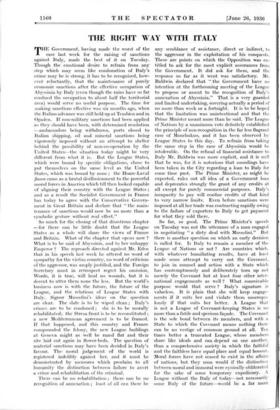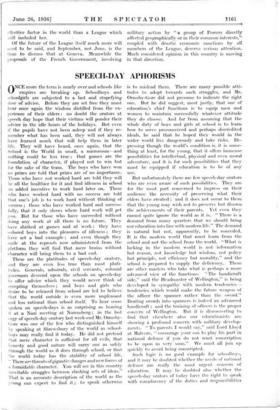THE RIGHT WAY WITH ITALY
THE Government, having made the worst of the case last week for the raising of sanctions against Italy, made the best of it on Tuesday. Though the emotional desire to refrain from any step which may seem like condonation of Italy's crime may be is strong, it has to be recognised, how- ever reluctantly, that the maintenance of purely economic sanctions after the effective occupation of Abyssinia by Italy (even though the rains have so far confined the occupation to about half the territorial area) would serve no useful purpose. The time for making sanctions effective was six months ago, when the Italian advance was still held up at Tembien and in Ogaden. If non-military sanctions had been applied as they should have been, with determined resolution —ambassadors being withdrawn, ports closed to Italian shipping, oil and mineral sanctions being vigorously imposed without an attempt to shelter behind the possibility of non-co-operation by the United States—the situation today might be very different from what it is. But the League States, which were bound by specific obligations, chose to put themselves on the same level as the United States, which was bound by none ; the Hoare-Laval fiasco came as a brutal disillusionment to the powerful moral forces in America which till then looked capable of aligning their country with the League States ; and as a result the Socialist Government in France has today to agree with the Conservative Govern- ment in Great Britain and declare that " the main- tenance of sanctions would now be no more than a symbolic gesture without real effect."
So much for the closing of that disastrous chapter —for there can be little doubt that the League States as a whole will share the views of France and Britain. What of the chapter that opens now ? What is to be said of Abyssinia, and to her unhappy Emperor ? The reproach directed against Mr. Eden that in his speech last week he uttered no word of sympathy for the victim country, no word of criticism of the aggressor, was amply justified, and the Foreign Secretary must in retrospect regret his omission. Words, it is true, will heal no wounds, but it is decent to utter them none the less. But the world's business now is with the future, the future of the League, and the relations of League States with Italy. Signor Mussolini's ideas on the question are clear. The slate is to be wiped clean ; Italy's crimes are to be condoned ; she is to be morally rehabilitated; the Stresa front is to be reconstituted ; a new Mediterranean agreement is to be framed. If that happened, and this country and France compounded the felony, the new League buildings at Geneva might as well be razed flat and their site laid out again in flower-beds. The question of material sanctions may have been decided in Italy's favour. The moral judgement of the world" is registered indelibly against her, and it must be demonstrated by measures which proclaim to all humanity the distinction between failure to avert a crime and rehabilitation of the criminal.
There can be no rehabilitation ; there can be no recognition of annexation ; least of all can there be any semblance of assistance, direct or indirect, to the aggressor in the exploitation of his conquests.
These are points on which the Opposition was en- titled to ask for the most explicit assurances from the Government. It did ask for them, and the response so far as it went was satisfactory. Mr. Baldwin declared that ".the Government have no intention at the forthcoming meeting of the League to propose or assent to the recognition of Italy's annexation of Abyssinia." That is a very guarded and limited undertaking, covering actually a period of no more than week or a fortnight. It is to be hoped that the limitation was unintentional and that the Prime Minister meant more than he said. The League of Nations by a unanimous vote definitely established the principle of non-recognition in the far less flagrant case of Manchukuo, and it has been observed by League States to this day. To refrain frOm taking the same step in the case of Abyssinia would be intolerable. On the refusal of financial assistance to Italy Mr. Baldwin was more explicit, and it is well that he was, for it is notorious that soundings have been taken in the City regarding a loan to Italy for some time past. The Prime Minister, as might be expected, rules out all idea of a Government loan and deprecates strongly the grant of any credits at all except for purely commercial purposes. Italy's incapacity to pay will confine credits of that kind to very narrow limits. Even before sanctions were imposed at all her trade was contracting rapidly owing to the failure of exporters to Italy to get payment for what they sold there.
So far, so good. The Prime Minister's speech on Tuesday was not the utterance of a man engaged in negotiating " a dirty deal with Mussolini." But there is another question on which an early decision is called for. Is Italy to remain a member of the League of Nations or not ? Are countries which, with whatever humiliating results, have at least made some attempt to carry out the Covenant, to join in counsel and action with a State which has contemptuously and deliberately torn up not merely the Covenant but at least four other inter- national engagements as well ? What conceivable purpose would that serve ? Italy's signature is valueless. It is plain that she will keep engage- ments if it suits her and violate them unscrupu- lously if that suits her better. A League that is not a League of Covenant-keeping States is no more than a futile and specious facade. The Covenant is the sole bond between its members, and with a State to which the Covenant means nothing there can be no vestige of common ground at all. Ten times better a truncated League, whose members share like ideals and can depend on one another, than a comprehensive society in which the faithful and the faithless have equal place and equal honour. Moral forces have not ceased to exist in the affairs of nations, but they soon would if the distinction between moral and immoral were cynically obliterated for the sake of some temporary expediency. A League without the Italy of today—not necessarily some Italy of the future—would be a far more effective factor in the world than a League which still included her.
Of the future of the League itself much more will need to be said, and September, not June, is the time to discuss that at Geneva. Meanwhile the proposals of the French Government, involving military action by " a group of Powers directly affected geographically or in their common interests," coupled with drastic economic sanctions by all members of the League, deserve serious attention. Much considered opinion in this country is moving in that direction.











































 Previous page
Previous page